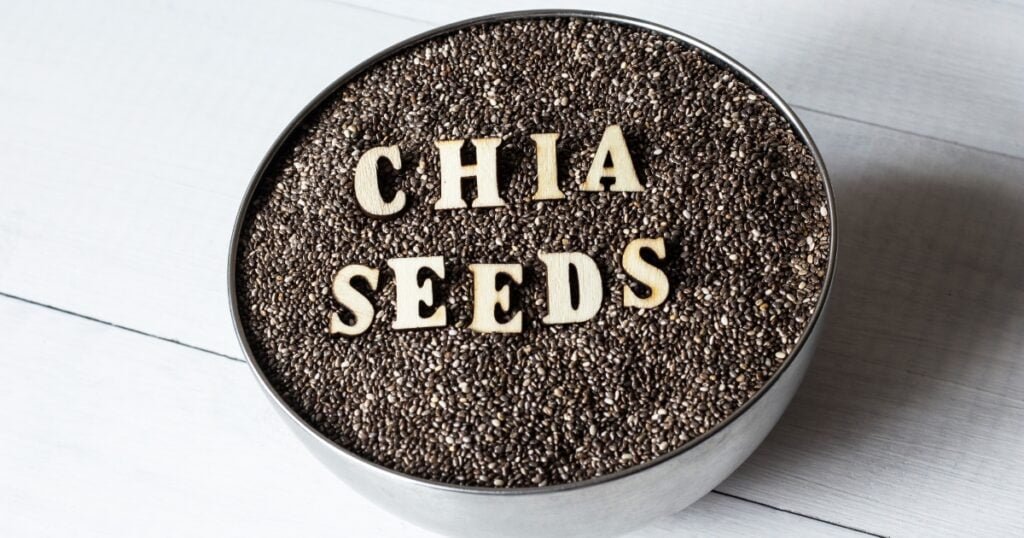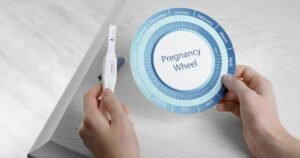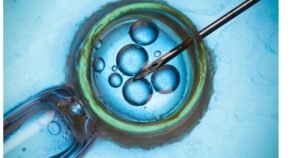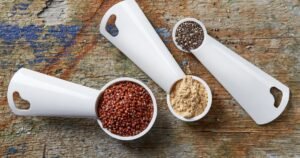Last Updated on 10 July 2024
Chia seeds have gained popularity recently for their numerous health benefits, including their potential to support fertility. These tiny seeds are packed with essential nutrients that can play a significant role in reproductive health and increase the chances of conception. If you are trying to get pregnant, incorporating chia seeds or any other fertility-boosting food item into your diet may be beneficial.
Chia seeds for fertility have been used for centuries, dating back to the Aztecs in Central America. These seeds were highly valued for their nutritional properties and used as currency. Due to their impressive nutritional profile, chia seeds are recognized as a superfood.
In this article, we will explore the nutritional profile of chia seeds and how they can enhance fertility. We will also discuss how chia seeds can improve hormonal balance, support ovulation, and enhance uterine health. Additionally, we will provide tips on incorporating chia seeds into your fertility diet, including simple recipes and the best times to consume them for maximum benefits. So, let’s dive in and discover how chia seeds can contribute to your fertility success.
The Nutritional Profile of Chia Seeds
Chia seeds are a nutritional powerhouse packed with essential nutrients that can support overall health and fertility. They are an excellent source of omega-3 fatty acids, which are beneficial for reproductive health and hormonal balance. Omega-3 fatty acids regulate hormone production, reduce inflammation, and improve egg quality.
Chia seeds are also rich in antioxidants, such as vitamin E, which can protect the reproductive cells from damage caused by free radicals. Additionally, chia seeds are loaded with fiber, which can help regulate blood sugar levels and support a healthy menstrual cycle. Pumpkin seeds, another fertility-boosting food, can be incorporated into your diet by sprinkling them over salads or adding them to a trail mix with chia seeds. Chia seeds provide a wide range of nutrients that can contribute to your fertility success.
Chia Seeds Are High in Omega-3 Fatty Acids
One key fertility benefit of chia seeds is their high content of omega-3 fatty acids. Omega-3 fatty acids play a crucial role in reproductive health and hormonal balance. They are essential for producing hormones that regulate the menstrual cycle and support ovulation. Omega-3 fatty acids also help reduce inflammation in the body, which can improve overall reproductive health.
Research has shown that omega-3 fatty acids can enhance sperm quality in men and improve egg quality in women. They also support the development of the uterine lining, which is important for implantation and successful pregnancy. Regularly consuming chia seeds and other plant-based omega-3 fatty acids like walnuts and ground flaxseeds can give your body a good source of these essential nutrients and boost fertility.
Chia Seeds Are Rich in Antioxidants
Another important fertility benefit of chia seeds is their high antioxidant content. Antioxidants are compounds that help protect cells from damage caused by free radicals, which can negatively affect egg quality and reproductive health. Chia seeds are packed with antioxidants, including vitamin E and vitamin C, known for improving egg quality. These antioxidants help neutralize free radicals and protect reproductive cells from damage. Regularly consuming chia seeds can increase your intake of antioxidants and improve your overall reproductive health. This can enhance your chances of conceiving and support a healthy pregnancy.
Chia Seeds Are Loaded with Fiber
Fiber is an essential nutrient for overall health and fertility. It is crucial for maintaining stable blood sugar levels, supporting a healthy menstrual cycle, and promoting regular bowel movements.
Chia seeds are an excellent source of fiber, with just one ounce containing approximately 10 grams. This high fiber content can help regulate blood sugar levels, preventing spikes and crashes that can negatively impact hormonal balance and fertility. It can also support a regular menstrual cycle by promoting the elimination of excess hormones from the body.
Incorporating chia seeds into your diet can provide significant fiber, contributing to overall fertility success. Adding them to smoothies, yogurt, or oatmeal can be an easy and delicious way to increase your fiber intake and support your reproductive health.
How Chia Seeds Enhance Fertility
Chia seeds offer several benefits that can enhance fertility. They improve hormonal balance, support ovulation, and enhance uterine health. Incorporating chia seeds into your fertility diet can optimize your reproductive health and increase your chances of conceiving. Let’s explore how chia seeds can contribute to your fertility success.
Chia Seeds Improve Hormonal Balance
Maintaining hormonal balance is crucial for fertility. Chia seeds can help improve hormonal balance by providing essential nutrients and supporting the production and regulation of reproductive hormones. The omega-3 fatty acids in chia seeds can help regulate hormone production and reduce inflammation, promoting hormonal balance. Consuming chia seeds regularly can support a regular menstrual cycle and enhance overall reproductive health. By improving hormonal balance, chia seeds can increase your chances of conceiving and support a healthy pregnancy.
Chia Seeds Support Ovulation
Ovulatory infertility is a common cause of difficulty in conceiving. Chia seeds can help support ovulation and reduce the risk of ovulatory infertility. The omega-3 fatty acids in chia seeds are crucial in regulating hormone production and promoting healthy ovulation. By consuming chia seeds regularly, you can lower the risk of ovulatory infertility and increase your chances of conceiving. Chia seeds also support hormone balance, which is essential for ovulation and fertility. Adding chia seeds to your diet can be a simple and effective way to support ovulation and enhance your fertility.
Chia Seeds Enhance Uterine Health
Uterine health is vital for successful implantation and a healthy pregnancy. Chia seeds can enhance uterine health by promoting blood flow to the uterus and supporting overall reproductive health. The omega-3 fatty acids in chia seeds can improve blood flow to the reproductive organs, which is essential for developing a healthy uterine lining. Regularly consuming chia seeds can enhance uterine health and support a healthy pregnancy. Incorporating chia seeds into your fertility diet can be a beneficial step in optimizing your reproductive health and increasing your chances of conceiving.
Incorporating Chia Seeds into Your Fertility Diet
Incorporating chia seeds into your fertility diet is simple and delicious. There are several ways to enjoy chia seeds and reap their fertility benefits. Let’s explore some easy ways to incorporate chia seeds into your daily routine.
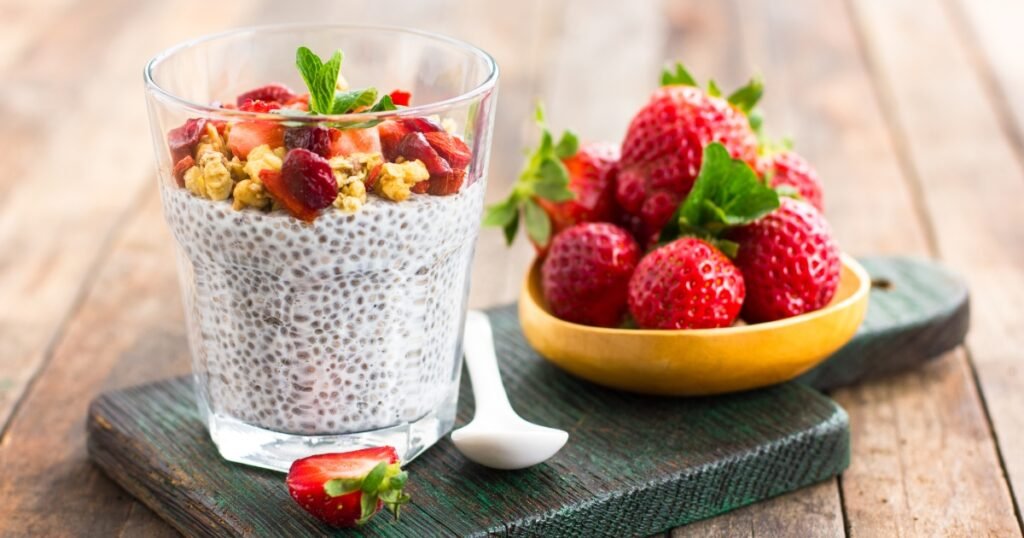
Simple Chia Seed Recipes for Daily Use
Chia seeds can be used in various recipes to add a nutritious boost to your meals. Here are some simple chia seed recipes that you can incorporate into your daily routine:
- Chia seed pudding: Mix chia seeds with your choice of milk (such as almond or coconut) and sweeten with honey or maple syrup. Let the mixture sit in the fridge overnight, and in the morning, you’ll have a delicious and nutritious chia seed pudding.
- Sprinkle chia seeds over yogurt or oatmeal for added texture and nutritional benefits.
- Add chia seeds to smoothies for a nutrient-packed boost.
- Incorporate chia seeds into baked goods, such as muffins or bread, for added nutrition.
Including these simple chia seed recipes in your daily diet can help you enjoy the fertility benefits of chia seeds while maintaining a balanced diet.
Best Times to Consume Chia Seeds for Maximum Benefits
Timing is important when consuming chia seeds for maximum fertility benefits. Here are the best times to consume chia seeds for optimal results:
- During the follicular phase: The follicular phase is the first half of your menstrual cycle, leading to ovulation. Consuming chia seeds during this phase can support hormone balance and prepare your body for ovulation.
- During ovulation: Eating chia seeds can provide the necessary nutrients to support healthy egg development and increase your chances of conception.
- Chia seeds can be consumed throughout the menstrual cycle to support overall reproductive health and hormonal balance.
By incorporating chia seeds into your diet at these times, you can maximize their fertility benefits and support your reproductive health.
Dos and Don’ts When Adding Chia Seeds to Your Diet
When adding chia seeds to your diet, it is important to keep a few dos and don’ts in mind to maximize their benefits:
- Do soak chia seeds before consuming them. Soaking them in water or another liquid can enhance nutrient absorption and make them easier to digest.
- Start with small quantities. If you are new to consuming chia seeds, start with small amounts and gradually increase your intake to allow your body to adjust.
- Don’t consume excessive amounts. While chia seeds are nutritious, consuming excessive amounts can lead to digestive issues. Stick to recommended serving sizes.
- Do pay attention to your blood sugar levels. Chia seeds can help stabilize blood sugar levels. Still, if you have diabetes or any other blood sugar-related condition, it’s important to monitor your levels closely and consult with a healthcare professional.
- Chia seeds should be incorporated into a balanced diet that includes a variety of nutrient-rich foods and superfoods like Maca to support overall fertility and health.
Following these dos and don’ts can help you make the most of chia seeds and incorporate them into your diet healthily and effectively.
Testimonials: Success Stories with Chia Seeds
Many women have reported success with incorporating chia seeds into their fertility journey. They have shared their stories of improved hormonal balance, regular cycles, and successful pregnancies. While individual experiences may vary, these success stories highlight the potential benefits of including chia seeds in your fertility diet. It is always important to consult a healthcare professional for personalized advice, but adding chia seeds to your diet may be a simple and delicious way to support your fertility journey.
Personal Journeys to Parenthood
Many couples face challenges on their fertility journey, and for those struggling with conditions like PCOS, the road to parenthood can be even more challenging. However, stories of hope and success prove that overcoming these obstacles and conceiving naturally is possible. Personal journeys to parenthood often involve lifestyle changes, including adopting a nutritious diet rich in whole grains, fruits, and vegetables.
Chia seeds and other foods like lean meats, fish, nuts, and seeds have significantly changed the fertility path for many couples. Couples have improved their hormone health and achieved fertility success by incorporating these nutrient-dense foods into their daily routine. These personal stories highlight the potential benefits of incorporating whole grains, like chia seeds, into a PCOS fertility diet to support reproductive health and increase the chances of pregnancy.
Chia seeds have been a game-changer for many couples struggling with fertility issues. The hormone-balancing properties of chia seeds have helped regulate menstrual cycles and improve hormone health, leading to increased chances of conception. By incorporating chia seeds into their diets, couples have experienced improved fertility success.

Chia seeds are rich in omega-3 fatty acids, which are crucial for hormone regulation and reproductive health. These essential fatty acids support the development and maturation of healthy eggs and help create an optimal environment for sperm to thrive. Chia seeds also provide essential nutrients like calcium, potassium, and iron, vital for overall reproductive health. With their nutrient-rich profile and hormone-balancing properties, chia seeds have become a go-to fertility superfood for many couples on their journey to parenthood.
Addressing Common Myths About Chia Seeds For Fertility
There are several common myths surrounding chia seeds and their impact on fertility. It is important to separate fact from fiction to make informed decisions about incorporating chia seeds into your fertility journey. Here are some common myths about chia seeds and the scientific evidence debunking them:
Myth: Chia seeds can instantly increase your chances of getting pregnant.
Fact: While chia seeds have been shown to support fertility health, no single food can guarantee instant pregnancy success. Focusing on overall hormone balance, a healthy diet, and lifestyle factors is essential.
Myth: Chia seeds can cure infertility.
Fact: While chia seeds offer several health benefits, they cannot cure underlying infertility issues. Infertility is a complex condition that often requires medical intervention. However, chia seeds can support reproductive health by providing essential nutrients like omega-3 fatty acids linked to improved fertility outcomes.
Scientific evidence has shown that omega-3 fatty acids play a vital role in reproductive health. They help regulate hormone levels, reduce inflammation, and improve egg and sperm quality. Chia seeds are an excellent source of omega-3 fatty acids, containing 64% alpha-linolenic acid (ALA), making them a valuable addition to a fertility-friendly diet. While they cannot cure infertility, incorporating chia seeds into a balanced diet can support overall reproductive health and potentially enhance fertility outcomes.
In a nutshell, chia seeds are a powerhouse of nutrition that can potentially enhance fertility. Their rich blend of omega-3 fatty acids, antioxidants, and fiber plays a vital role in hormonal balance, ovulation support, and uterine health. You may witness positive outcomes by incorporating chia seeds into your fertility diet through simple recipes and timely consumption. If you are curious about chia seeds’ impact on fertility or looking for natural ways to boost your reproductive health, exploring the possibilities with these tiny seeds could be a worthwhile journey.

